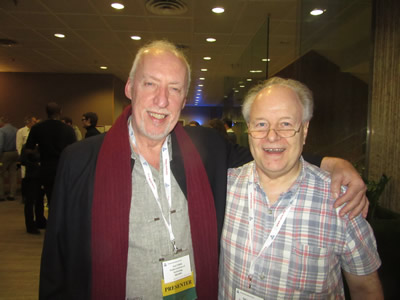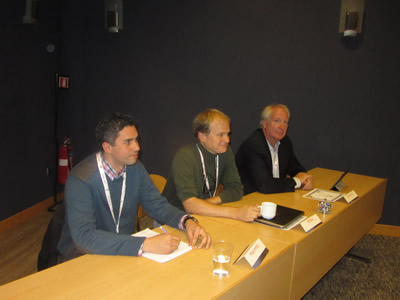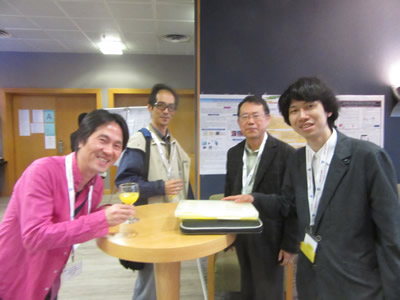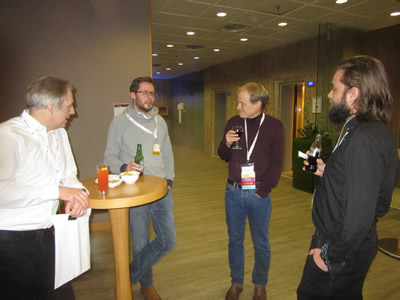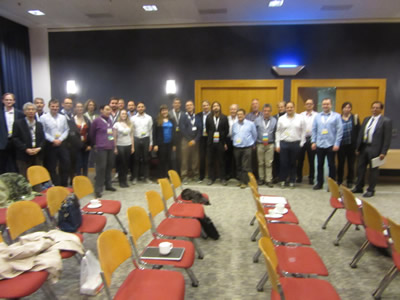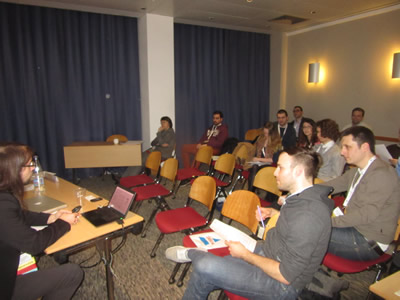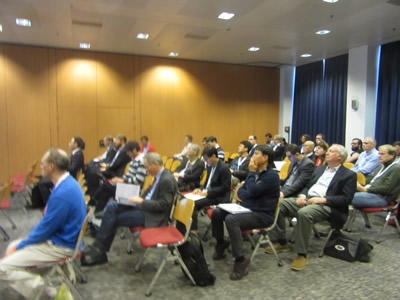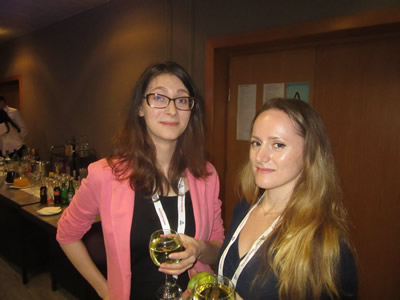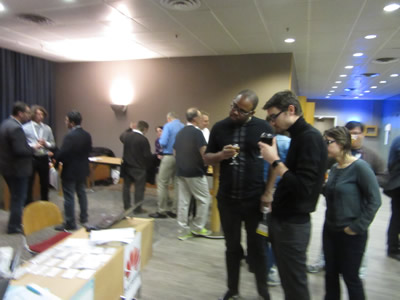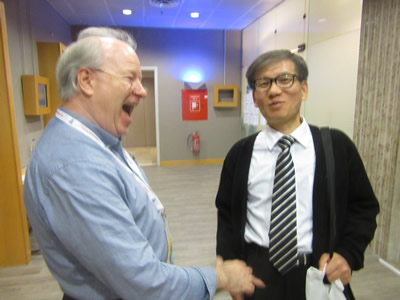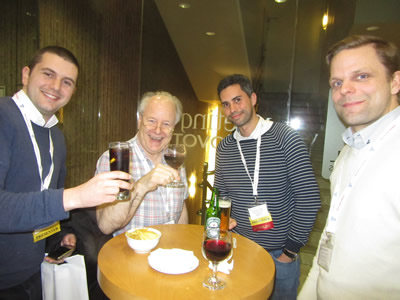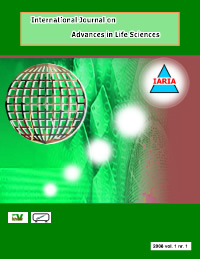GLOBAL HEALTH 2018 - The Seventh International Conference on Global Health Challenges
November 18, 2018 - November 22, 2018
GLOBAL HEALTH 2018: Call for Papers
Recent advances in technology and computational science influenced a large spectrum of branches in approaching population health. Despite significant progresses, many challenges exist, including health informatics, cross-country platforms interoperability, system and laws harmonization, protection of health data, practical solutions, accessibility to health services, and many others. Along with technological progress, personalized medicine, ambient assistance and pervasive health complement patient needs. A combination of classical and information-driven approach is developing now, where diagnosis systems, data protection mechanisms, remote assistance and hospital-processes are converging.
GLOBAL HEALTH 2018 takes a global perspective on population health, from national to cross-country approaches, multiplatform technologies, from drug design to medicine accessibility, everything under mobile, ubiquitous, and personalized characteristics of new age population.
We solicit both academic, research, and industrial contributions. We welcome technical papers presenting research and practical results, position papers addressing the pros and cons of specific proposals, such as those being discussed in the standard fora or in industry consortia, survey papers addressing the key problems and solutions on any of the above topics short papers on work in progress, and panel proposals.
Industrial presentations are not subject to the format and content constraints of regular submissions. We expect short and long presentations that express industrial position and status.
Tutorials on specific related topics and panels on challenging areas are encouraged.
The topics suggested by the conference can be discussed in term of concepts, state of the art, research, standards, implementations, running experiments, applications, and industrial case studies. Authors are invited to submit complete unpublished papers, which are not under review in any other conference or journal in the following, but not limited to, topic areas.
All topics and submission formats are open to both research and industry contributions.
GLOBAL HEALTH 2018 conference tracks:
Fundamentals
Foundations in global health informatics; Computational health; Software for health; Independent living technologies; ICT and health; Platform interoperability; Semantic interoperability; Diagnosis systems; Applied health informatics; User interfaces and visualization
Health and Wellness Informatics
Computation models and human body; Imaging and modelling of human body; Visual and knowledge artifacts; Feature analysis and classification; Machine learning, simulation, and image analysis; Image registration and correlation analysis; Sensing and detecting devices; 3d MRI and optical mapping; Semantic representation of human body data; Trusted information for personal wellness; Cloud outsourcing of medical image repositories; Web-base decision support systems; Adverse drug event notification systems; Cross-hospital resource management systems; Nurse challenges with IT and electronic medical records; Clinical personal self-management; Care continuity
Medical Systems and Technologies
Scalable medical systems; Hospital medical systems architecture; Medical-oriented communication protocols; Integration of heterogeneous medical systems; Noncontact human vital-signs sensing systems; Rehabilitation systems; Medical implant technologies; Digital biomedical images; Systems for measuring tissue parameters; Macroscopy and microscopy systems; Video-based healing systems; Mammograms systems; Patient-centric electronic health record systems; ICT platforms for domestic healthcare of patients affected by chronic diseases; Systems for monitoring special diseases (Parkinson, Alzheimer, Diabetes, etc.); Real-time medical data collection
Technology
Bio-medical semantics; Bio-medicine; Disease biomarker prediction; Applications of bio-nano technology; Body networks; Mobile healthcare; Ubiquitous healthcare; Human body communication devices; In-body video-driven navigation exploration; Wireless communication and inferences in in body networks-working environments ; Acoustic metrics and patterns for body exploration systems; Near-field effect and implant body area networks; Assisted wireless body area systems; Medical systems based on smart devices
Trends
Clinical epigenetic; Long term health conditions; Ambient assisted; Genetics; Virtual reality in medicine surgery; Clinical trials; Computational and knowledge management on proteomics and genomics; Drug design, disease diagnosis and control
Practice
Nursing; Patient-centered care; Personalized medicine; Pervasive health; Homecare; Pharmaceutical services
Alternative
Biomedicine; Natural medicine; Preventive medicine; Chronic diseases following; Home surveillance
Challenges
Security aspects and access control on medical data; Data management in pervasive context; Data quality assurance and provenance; Patient flow models in hospitals; Clinical data analysis; Information visualization of medical data; Performance of medical systems; Accuracy of medical systems; Scalability evaluation; Mobile clouds in medical scenarios ; Security of medical systems; Privacy for wired and wireless medical devices
Global
eHealth initiatives; Social medicine; Health global accessibility; Epidemic spreading and control; Health Education; Providing health in remote areas; Decision support within healthcare; Ethical aspects in eHealth; Healthcare plans and patient benefits; Synchronization of federal regulations; Availability of medication; Community health services
Deadlines:
Submission | Aug 01, 2018 |
Notification | Sep 04, 2018 |
Registration | Sep 17, 2018 |
Camera ready | Sep 25, 2018 |
Deadlines differ for special tracks. Please consult the conference home page for special tracks Call for Papers (if any).
INSTRUCTION FOR THE AUTHORS
Authors of selected papers will be invited to submit extended versions to one of the IARIA Journals.
Publisher: XPS (Xpert Publishing Services)
Archived: ThinkMindTM Digital Library (free access)
Prints available at Curran Associates, Inc.
How to submit to appropriate indexes.
Only .pdf or .doc files will be accepted for paper submission. All received submissions will be acknowledged via an automated system.
Contribution types
- regular papers [in the proceedings, digital library]
- short papers (work in progress) [in the proceedings, digital library]
- ideas: two pages [in the proceedings, digital library]
- extended abstracts: two pages [in the proceedings, digital library]
- posters: two pages [in the proceedings, digital library]
- posters: slide only [slide-deck posted on www.iaria.org]
- presentations: slide only [slide-deck posted on www.iaria.org]
- demos: two pages [posted on www.iaria.org]
FORMATS
Only .pdf or .doc files will be accepted for paper submission. All received submissions will be acknowledged via an automated system.
Final author manuscripts will be 8.5" x 11", not exceeding 6 pages; max 4 extra pages allowed at additional cost.
Helpful information for paper formatting for MS Word can be found here.
There is a community provided LaTeX template: the CTAN package iaria (with full IARIA formatting rules, including IARIA citation style, but for providing citation style it is tightly bound to pdflatex+biblatex+biber). In addition, there is also iaria-lite (not bound to pdflatex+biblatex+biber, but compatible with any TeX stack; thus, it cannot provide the IARIA citation formattings, but only the titlepage and content-related IARIA formatting rules). Based on the iaria package, there is a minimal working example as Overleaf template. When you are using the LaTeX templates, please still adhere to the additional editorial rules.
Slides-based contributions can use the corporate/university format and style.
Your paper should also comply with the additional editorial rules.
Once you receive the notification of contribution acceptance, you will be provided by the publisher an online author kit with all the steps an author needs to follow to submit the final version. The author kits URL will be included in the letter of acceptance.
We would recommend that you should not use too many extra pages, even if you can afford the extra fees. No more than 2 contributions per event are recommended, as each contribution must be separately registered and paid for. At least one author of each accepted paper must register to ensure that the paper will be included in the conference proceedings and in the digital library, or posted on the www.iaria.org (for slide-based contributions).
CONTRIBUTION TYPE
Regular Papers (up to 6-10 page article -6 pages covered the by regular registration; max 4 extra pages allowed at additional cost- ) (oral presentation)
These contributions could be academic or industrial research, survey, white, implementation-oriented, architecture-oriented, white papers, etc. They will be included in the proceedings, posted in the free-access ThinkMind digital library and sent for indexing. Please submit the contributions following the instructions for the regular submissions using the "Submit a Paper" button and selecting the appropriate contribution type. 12-14 presentation slides are suggested.
Short papers (work in progress) (up to 4 pages long) (oral presentation)
Work-in-progress contributions are welcome. These contributions represent partial achievements of longer-term projects. They could be academic or industrial research, survey, white, implementation-oriented, architecture-oriented, white papers, etc. Please submit the contributions following the instructions for the regular submissions using the "Submit a Paper" button and selecting the contribution type as work in progress. Contributors must follow the conference deadlines, describing early research and novel skeleton ideas in the areas of the conference topics. The work will be published in the conference proceedings, posted in the free-access ThinkMind digital library and sent for indexing. For more details, see the Work in Progress explanation page. 12-14 presentation slides are suggested.
Ideas contributions (2 pages long) (oral presentation)
This category is dedicated to new ideas in their very early stage. Idea contributions are expression of yet to be developed approaches, with pros/cons, not yet consolidated. Ideas contributions are intended for a debate and audience feedback. Please submit the contributions following the instructions for the regular submissions using the "Submit a Paper" button and selecting the contribution type as Idea. Contributors must follow the conference deadlines, describing early research and novel skeleton ideas in the areas of the conference topics. The work will be published in the conference proceedings, posted in the free-access ThinkMind digital library and sent for indexing. For more details, see the Ideas explanation page. 12-14 presentation slides are suggested.
Extended abstracts (2 pages long) (oral presentation)
Extended abstracts summarize a long potential publication with noticeable results. It is intended for sharing yet to be written, or further on intended for a journal publication. Please submit the contributions following the instructions for the regular submissions using the "Submit a Paper" button and selecting the contribution type as Extended abstract. Contributors must follow the conference deadlines, describing early research and novel skeleton ideas in the areas of the conference topics. The work will be published in the conference proceedings, posted in the free-access ThinkMind digital library and sent for indexing. 12-14 presentation slides are suggested.
Posters (paper-based, two pages long) (oral presentation)
Posters are intended for ongoing research projects, concrete realizations, or industrial applications/projects presentations. The poster may be presented during sessions reserved for posters, or mixed with presentation of articles of similar topic. A two-page paper summarizes a presentation intended to be a POSTER. This allows an author to summarize a series of results and expose them via a big number of figures, graphics and tables. Please submit the contributions following the instructions for the regular submissions using the "Submit a Paper" button and selecting the contribution type as Poster Two Pages. Contributors must follow the conference deadlines, describing early research and novel skeleton ideas in the areas of the conference topics. The work will be published in the conference proceedings, posted in the free-access ThinkMind digital library and sent for indexing. 8-10 presentation slides are suggested. Also a big Poster is suitable, used for live discussions with the attendees, in addition to the oral presentation.
Posters (slide-based, only) (oral presentation)
Posters are intended for ongoing research projects, concrete realizations, or industrial applications/projects presentations. The poster may be presented during sessions reserved for posters, or mixed with presentation of articles of similar topic. The slides must have comprehensive comments. This type of contribution only requires a 8-10 slide-deck. Please submit the contributions following the instructions for the regular submissions using the "Submit a Paper" button and selecting the contribution type as Poster (slide-only). The slide-deck will be posted, post-event, on www.iaria.org.
8-10 presentation slides are suggested. Also a big Poster is suitable, used for live discussions with the attendees, additionally to the oral presentation.
Presentations (slide-based, only) (oral presentation)
These contributions represent technical marketing/industrial/business/positioning presentations. This type of contribution only requires a 12-14 slide-deck. Please submit the contributions following the submission instructions by using the "Submit a Paper" button and selecting the contribution type as Presentation (slide-only). The slide-deck will be posted, post-event, on www.iaria.org.
12-14 presentation slides are suggested.
Demos (two pages) [posted on www.iaria.org]
Demos represent special contributions where a tool, an implementation of an application, or a freshly implemented system is presented in its alfa/beta version. It might also be intended for thsoe new application to gather the attendee opinion. A two-page summary for a demo is intended to be. It would be scheduled in special time spots, to ensure a maximum attendance from the participants. Please submit the contributions following the submission instructions by using the "Submit a Paper" button and selecting the contribution type as Demos. The Demos paper will be posted, post-event, on www.iaria.org.
Tutorial proposals
Tutorials provide overviews of current high interest topics. Proposals should be for 2-3 hour long. Proposals must contain the title, the summary of the content, and the biography of the presenter(s). The tutorial slide decks will be posted on the IARIA site.
Please send your proposals to tutorial proposal
Panel proposals
The organizers encourage scientists and industry leaders to organize dedicated panels dealing with controversial and challenging topics and paradigms. Panel moderators are asked to identify their guests and manage that their appropriate talk supports timely reach our deadlines. Moderators must specifically submit an official proposal, indicating their background, panelist names, their affiliation, the topic of the panel, as well as short biographies. The panel slide deck will be posted on the IARIA site.
Please send your proposals to panel proposal
